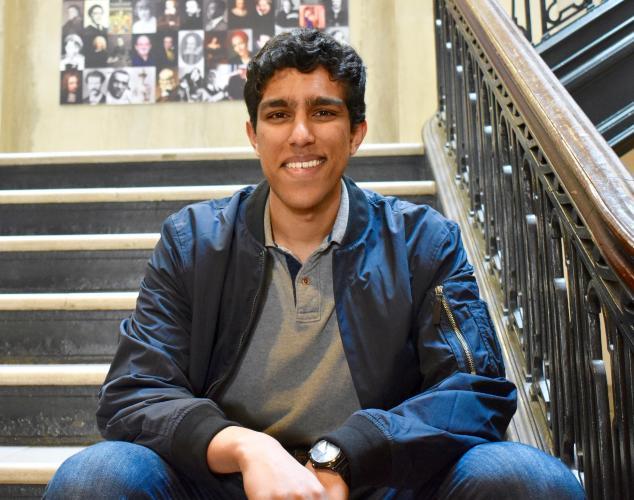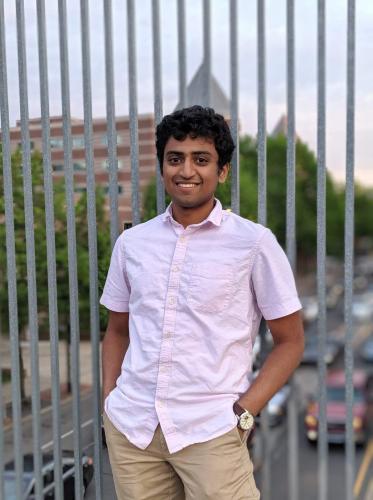Vignesh Bhethanabotla and Adithya Sriram, two current seniors in the Vagelos Integrated Program in Energy Research (VIPER) at the University of Pennsylvania, have been awarded highly-selective National Science Foundation (NSF) Graduate Research Fellowships! Fellowships are awarded to outstanding early-career graduate students and provide three years of support over a five-year period for graduate-level study in research-based STEM or STEM education fields. Keep reading to learn more about their reflections on their time at Penn and plans for the future.

Vignesh Bhethanabotla
When Vignesh first applied to undergraduate schools, he knew that he had an interest in research and wanted to have a strong foundation in both fundamental science and engineering applications, specifically in Physics and Chemical Engineering, so he felt that VIPER was a great fit from the start.
For Vignesh, it was great that VIPER facilitated his research journey so early in his undergraduate career. He had previously had experience with experimental research in high school and was excited to do more theory-based work. Vignesh worked with Professor Andrew M. Rappe, who is a VIPER Faculty Co-Director and Professor of Chemistry and Materials Science Engineering, for all four years. His research focused on predicting properties of materials in a variety of different projects, including investigating reaction pathways for organic molecules, a molecular switch that changes based on its chemical environment, and surface chemistry for catalysis.
As a first year, Vignesh appreciated being a part of a small, tight-knit program with the ability to interface with older students. Additionally, he recently co-founded a club with another VIPER student, Richard Ling (Class of 2020), called Sustainable Solutions, which promotes sustainability initiatives through student-led projects. Additionally, he has been a Teaching Assistant for CHEM 115 (Honors Chemistry I) for three years. CHEM 115 is taught by Professor Rappe, and Vignesh has especially enjoyed working with Professor Rappe to add a computational research project component to the class.
After Penn, Vignesh will be attending The California Institute of Technology in Pasadena, California to pursue his Ph.D. in Chemical Engineering. He is excited to learn more about theoretical chemistry and condensed matter physics.
For the NSF Graduate Research Fellowship, Vignesh found the application process itself to be a great experience because it gave him the opportunity to reflect on his research experiences at Penn and develop a concrete and specific proposal with a forward look toward his future contributions to the field. For him, this really served as a culmination of his research experiences. His proposal was focused on materials predictions for specific applications in energy research.
When asked if he has any words of wisdom to share with VIPER students, he encouraged students to explore – whether that is looking at different research approaches, different major combinations, or just plain trying new things -- to really hone in on what is the right fit for them.

Adithya Sriram
Adithya will be graduating from Penn with a Bachelor of Arts as a dual-major in Physics and Biophysics, a Bachelor of Science in Engineering in Chemical and Biomolecular Engineering and a Master of Science in Physics and Astronomy. He joined the lab of Professor Charlie Johnson in Physics after taking one of Professor Johnson’s courses at Penn. Adithya worked in his lab every summer throughout his undergraduate career and appreciated that VIPER provided funding to help him conduct research for all three summers. In Professor Johnson’s lab, he studied applications of 2D materials, specifically working with graphene to make devices that had applications in chemical-sensing. He appreciated that Professor Johnson granted him the autonomy and freedom to explore new ideas!
At Penn, Adithya enjoyed getting to know a community of scientists and highly valued having the flexibility to take advanced courses. Adithya was also awarded the Roy and Diana Vagelos Science Challenge Award, which is geared towards supporting outstanding, advanced students in the sciences at Penn.
Adithya also dedicated time to volunteering at West Philadelphia schools to teach physics in various ways. For example, he was involved in several programs through the Netter Center for Community Partnerships and served as a Teaching Assistant for an Academically Based Community Service class where he helped design experiments for high school students. He greatly enjoys teaching, so this was an excellent way for him to do something fun and contribute to his local community.
His immediate plan for next year is to work at the Max Planck Institute of Quantum Optics in Germany on a 9-month Fulbright Scholarship. He plans to study materials that he has been working on at Penn with ultra-fast laser spectroscopy to gain a better understanding of the underlying physics of those materials. Afterwards, in Fall 2021, he will start his Ph.D. in Physics at Stanford University in Stanford, California. Adithya plans to focus his research in condensed matter physics, although he is looking forward to exploring this field from different perspectives in graduate school.
When asked if he has any words of wisdom to share with VIPER students, he encouraged students to take risks and to pave their own way!
